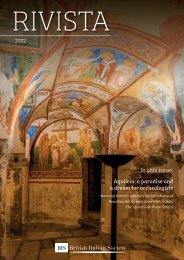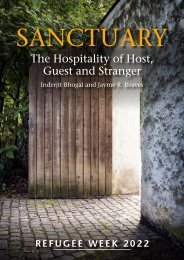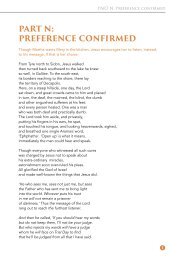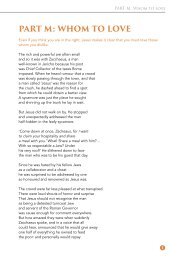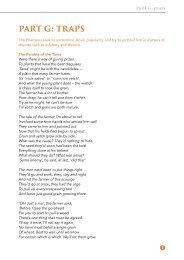SANCTUARY
The Hospitality of Host, Guest and Stranger Inderjit Bhogal and Jayme R. Reaves
The Hospitality of Host, Guest and Stranger Inderjit Bhogal and Jayme R. Reaves
You also want an ePaper? Increase the reach of your titles
YUMPU automatically turns print PDFs into web optimized ePapers that Google loves.
<strong>SANCTUARY</strong><br />
The Hospitality of Host,<br />
Guest and Stranger<br />
Inderjit Bhogal and Jayme R. Reaves<br />
REFUGEE WEEK 2022<br />
Sanctuary: The Hospitality of Host, Guest and Stranger 1
Unless otherwise stated, Scripture quotations are<br />
taken from the New Revised Standard Version<br />
Bible: Anglicised Edition, copyright © 1989,<br />
1995 the Division of Christian Education of the<br />
National Council of the Churches of Christ in the<br />
United States of America. Used by permission. All<br />
rights reserved.<br />
Scripture quotations marked ‘GNT’ are from the<br />
Good News Bible © 1994 published by the Bible<br />
Societies/HarperCollins Publishers Ltd UK, Good<br />
News Bible© American Bible Society 1966, 1971,<br />
1976, 1992. Used with permission.<br />
Published by Churches Together<br />
in Britain and Ireland<br />
Interchurch House<br />
35 Lower Marsh<br />
London SE1 7RL<br />
+44 (0) 20 3794 2288 (phone)<br />
info@ctbi.org.uk<br />
www.ctbi.org.uk<br />
Registered charity no. 1113299 (England & Wales)<br />
Company limited by guarantee, registered no. 5661787<br />
© CTBI 2022
Foreword<br />
It is an ancient tradition across the world that holy places are considered<br />
places of sanctuary for those at risk of persecution. In the Christian faith<br />
this principle is enshrined in Scripture and given powerful expression<br />
in the ministry of Christ and the disciples of the early Church, who sought<br />
hospitality as they journeyed to share the Good News in dangerous times.<br />
This resource aims to support individual Christians, church communities<br />
and ecumenical groups in reflecting on the significance of sanctuary for<br />
our times in the context of Refugee Week. The Sunday at the end of the<br />
week is designated as Sanctuary Sunday to give expression through prayer<br />
and witness to the centrality of sanctuary and hospitality to the stranger<br />
in the Christian call to love our neighbours. At its heart, this work is<br />
about connecting people, locally and globally, with respect for the dignity<br />
of every human person as made in the image and likeness of God.<br />
On behalf of all at CTBI, I would like to thank Revd Dr Inderjit Bhogal for<br />
his inspiring and generous leadership in this area, which continues to bear<br />
fruit in the increasing number of churches making the commitment to<br />
become a Church of Sanctuary so that they might serve as that beacon of<br />
hope for those in need of shelter and community. I would also like to thank<br />
Dr Jayme Reaves, who alongside Inderjit, played a pivotal role in the writing<br />
of this new resource.<br />
Dr Nicola Brady,<br />
General Secretary,<br />
Churches Together in Britain and Ireland
For further reflection and action there are resources<br />
available on the Churches Together in Britain and<br />
Ireland’s Church of Sanctuary website:<br />
www.churchofsanctuary.org<br />
4 Sanctuary: The Hospitality of Host, Guest and Stranger
Introduction<br />
According to the United Nations High Commissioner for Refugees (UNHCR), around 90% of<br />
the world’s refugees come from countries in or close to war and conflict, and almost<br />
90% of all refugees live in countries neighbouring their country of origin.<br />
Wars make refugees. In the long term, the only solution to the unprecedented numbers of<br />
refugees in the world is the cessation of war and conflict, and a world without war. This is the<br />
clear lesson from the current Russia–Ukraine conflict.<br />
In international law there is no “illegal” or “bogus” asylum seeker. Anyone has the right to<br />
apply for asylum in any country that has signed the 1951 UN Refugee Convention, and to<br />
remain there until authorities have assessed their claim. Plans to relocate asylum seekers to<br />
another country are hostile; they penalise already humiliated people, and also contravene<br />
international law.<br />
The criterion for determining refugee status is fleeing danger and seeking safety, not the means<br />
of travel or routes taken, not ethnicity, not the colour of skin, not nationality. All refugees have<br />
to be treated equally. Can Christians who hold to the promise of the Kingdom of God accept<br />
a situation where people’s human rights, and human dignity, are deemed to disappear at a<br />
border?<br />
Jesus’ followers turn to his story about the Good Samaritan (Luke 10:29-37), where a man<br />
despised for his faith offered compassion and care for a wounded man. The story illustrates<br />
how compassion is not restricted by borders and identity.<br />
Biblical witness carries a call for the protection and safety of people whose lives are in danger<br />
while their case is processed (Numbers 35). God called on Moses to set up cities of refuge to<br />
ensure this. In this wisdom is the root of the contemporary movement and network of City of<br />
Sanctuary, which has led to the development of the Church of Sanctuary work.<br />
Sanctuary is built on protective safety, and it challenges hostility with hospitality. In all human<br />
faith and practice, hospitality is the established way of handling difference and transcending<br />
borders and barriers, and expressing respect for the worth of people, especially those<br />
considered to be least worthy and most excluded.<br />
A Church of Sanctuary will respond to refugees on the basis of fact not fiction, hospitality not<br />
hostility, and will do this as integral to Christian discipleship.<br />
This resource offers reflections, prayers and ideas for action to explore issues around Church<br />
of Sanctuary within Refugee Week and Sanctuary Sunday, the Sunday at the end of Refugee<br />
Week. I am extremely grateful to my friend and colleague, Dr Jayme Reaves, for her sterling<br />
contributions in co-writing this resource.<br />
May God, our refuge and shelter, who takes sanctuary in us, strengthen our resolve to be people of<br />
sanctuary, that we might build cultures of welcome and hospitality and act with protective care for all<br />
who are in need of sanctuary. We pray for a world without war in which all can live safely and without<br />
fear in their own homes.<br />
Inderjit Bhogal<br />
Sanctuary: The Hospitality of Host, Guest and Stranger 5
“I was a stranger and you<br />
welcomed me...”<br />
[Matthew 25:35]<br />
6 Sanctuary: The Hospitality of Host, Guest and Stranger
DAY ONE:<br />
God Takes Sanctuary<br />
Bible Passages for Reflection<br />
Exodus 25:8<br />
Have them make me a sanctuary, so that I may dwell among them.<br />
John 1:14<br />
And the Word became flesh and lived among us.<br />
Revelation 3:20<br />
I am standing at the door, knocking; if you … open the door,<br />
I will come in to you and eat with you, and you with me.<br />
Reflection on the Passages<br />
The Bible places God at the centre of all creation (Genesis 1). Heaven and heaven’s heaven<br />
cannot confine God (1 Kings 8:27). Yet God asks for sanctuary (Exodus 25:8). This is an<br />
astonishing request.<br />
In John 1:14 the Good News disclosed in Jesus is summarised in this way:<br />
And the Word became flesh and lived among us.<br />
The Greek word translated as “lived” has its root in a word meaning “tent”, a word used also for<br />
the “Tabernacle” where the Ark of the Covenant was housed. It is a word used by Peter on the<br />
Mount of Transfiguration when he says, “I will make three dwellings here” (Matthew 17:4; see<br />
also, for example, Hebrews 8:5; 9:1, 21; 11:9).<br />
The “Tabernacle” was the portable sanctuary constructed at Sinai and primarily associated with<br />
the wanderings of the Hebrew people in the wilderness. It was the sacred space where God was<br />
considered to dwell among people.<br />
The first one for whom sanctuary must be provided is God. God is revealed and encountered in<br />
sanctuary.<br />
This sanctuary for God was not a house, not a mansion, not even a stable, or anything solid and<br />
permanent. It was mobile, and it represented the mobility of the travelling God accompanying<br />
a travelling people in all their journeying.<br />
The Nativity stories reveal God taking sanctuary among people with the vulnerability and<br />
dependency of a child.<br />
Sanctuary: The Hospitality of Host, Guest and Stranger 7
The first requirement, for the birth of Christ, is a sanctuary, to make a little<br />
room challenging the idea that there was “no room” (Luke 2:7, GNT).<br />
Not long after Jesus’ birth, Mary and Joseph are said to flee with their child<br />
to Egypt as refugees seeking sanctuary (Matthew 2:13-15).<br />
The stories surrounding Jesus and the early Church, in Luke and Acts,<br />
continue the theme of journey. An illuminating story tells of the encounter<br />
with the risen Christ who meets and walks with his friends as a “stranger”<br />
on the road to Emmaus, how he becomes their guest, and how he also<br />
takes up the role of host and is revealed in the breaking of the bread (Luke<br />
24:13-35).<br />
The image of Jesus standing at the door, knocking, is traditionally seen as<br />
Jesus knocking on the door of a soul. Can we see here an image of someone<br />
knocking for sanctuary, and see the face of Christ in them?<br />
Questions for Further Reflection<br />
What do we learn from God’s request for sanctuary?<br />
Where do you discern God asking you for sanctuary?<br />
Where do you see the face of Christ “standing at the door,<br />
knocking”?<br />
Suggested Action<br />
Write a short story outlining the situation faced by Mary,<br />
Joseph and the infant Jesus when seeking sanctuary. Then<br />
turn to recent stories from the news of people displaced by<br />
conflict, climate breakdown or natural disasters. Where do<br />
you see parallels with the story you have written?<br />
Prayer<br />
Holy God, you are my soul’s shelter. In you is my refuge and my<br />
eternal resting place. In all my wanderings you bring me to my<br />
own door and welcome me there, and nourish me.<br />
Amen.<br />
8 Sanctuary: The Hospitality of Host, Guest and Stranger
DAY TWO:<br />
Protective Hospitality<br />
Bible Passages for Reflection<br />
Leviticus 19:33-34<br />
When an alien resides with you in your land, you shall not oppress the alien.<br />
The alien who resides with you shall be to you as the citizen among you; you<br />
shall love the alien as yourself, for you were aliens in the land of Egypt: I am<br />
the Lord your God.<br />
Luke 10:25-28<br />
Just then a lawyer stood up to test Jesus. “Teacher,” he said, “what must I do<br />
to inherit eternal life?” He said to him, “What is written in the law? What<br />
do you read there?” He answered, “You shall love the Lord your God with all<br />
your heart, and with all your soul, and with all your strength, and with all<br />
your mind; and your neighbour as yourself.” And he said to him, “You have<br />
given the right answer; do this, and you will live.”<br />
John 15:12-14<br />
This is my commandment, that you love one another as I have loved you. No<br />
one has greater love than this, to lay down one’s life for one’s friends. You are<br />
my friends if you do what I command you.<br />
Reflection on the Passages<br />
In Luke’s Gospel, Jesus gives a sermon by telling the story of the Good Samaritan to explore<br />
the question of who is our neighbour. Thousands of pages have been spent on this parable,<br />
but ultimately what we take away from it is that our neighbour is the one in need, the one we<br />
are not necessarily prepared for, the one whose life and well-being are at stake. We are called<br />
to take responsibility for them, to offer a safe place to recuperate, and to put our own needs<br />
on a par with theirs. Jesus’ story teaches us that hospitality is not just about welcoming those<br />
we know and love, but also about providing protection and sanctuary to those who have been<br />
threatened, abused and neglected.<br />
This is not something we can afford to be naïve about: the provision of protective hospitality<br />
is risky to both the guest and the host. We are all connected to one another. To protect and<br />
defend our own interests to the detriment of another’s life and well-being is not what loving<br />
our neighbour entails. Jesus’ words in John 15 tell us that we are to love others as he has<br />
loved us: to be prepared to put ourselves at risk for others. Our lives are worth no more, and<br />
no less, than our neighbours’ lives.<br />
Sanctuary: The Hospitality of Host, Guest and Stranger 9
Questions for Further Reflection<br />
Put yourself in the shoes of someone who has been forced to abandon<br />
their home and life as they knew it in one place and flee to another in<br />
search of safety.<br />
What must it feel like?<br />
What needs would you have in that situation?<br />
How would you want someone to respond?<br />
Suggested Action<br />
Get in touch with an organisation such as City of Sanctuary,<br />
Refugees at Home or the resettlement programme at your<br />
local council to see how you can get involved in providing<br />
sanctuary for refugees in your community.<br />
Celebrate the contributions of refugees and people seeking<br />
sanctuary.<br />
Find ways of demonstrating solidarity with those displaced<br />
and seeking sanctuary.<br />
Prayer<br />
Welcoming God, who is our refuge in times of trouble, you call<br />
us to be your ambassadors, to reflect your own character and to<br />
love our neighbours. Help us to grow in our capacity to provide<br />
hospitality, care and responsibility toward those who are in need<br />
of sanctuary.<br />
Amen.<br />
10 Sanctuary: The Hospitality of Host, Guest and Stranger
DAY THREE:<br />
The Gifts Others Bring<br />
Bible Passages for Reflection<br />
Genesis 2:18<br />
Then the Lord God said, “It is not good that the man should be alone; I will<br />
make him a helper as his partner.”<br />
Hebrews 13:1-2<br />
Let mutual love continue. Do not neglect to show hospitality to strangers, for<br />
by doing that some have entertained angels without knowing it.<br />
Reflection on the Passages<br />
Hospitality is deeply connected to reciprocity and mutuality, and we never know what<br />
unexpected gifts (and challenges) it may bring as a result. We know that we are not created to<br />
be alone, but instead to be in community. We welcome others not only because God tells us<br />
to, but also because we don’t know when we might be in need sometime in the future and,<br />
naturally, we would want someone to do the same for us. Yesterday’s passage in Leviticus 19<br />
reminds us that we are to welcome others because we were once strangers too and we should<br />
know how it feels.<br />
Often when we talk about hospitality, we talk about feeding people or welcoming them into<br />
our space, which assumes we are talking about hospitality only from the host’s perspective.<br />
But what about the guest? In what ways might the guest reciprocate and offer us hospitality in<br />
return? In the practice of hospitality, the most meaningful and transformative experiences are<br />
when the guest becomes host and the host becomes guest. We know each other when we can<br />
empathise, put ourselves in each other’s position and share in each other’s experiences.<br />
If you are just feeding people in need, that is charity (which is good), but it is not hospitality as<br />
it offers no space for mutuality and reciprocity. Guests must be given space to host as well: to<br />
offer a story, to get to know the host, to ask questions, to contribute to the meal or offer a gift in<br />
whatever form it takes. The gift may simply be a relationship or an experience that enables the<br />
host to open up and see the world through the guest’s eyes.<br />
Sanctuary: The Hospitality of Host, Guest and Stranger 11
Questions for Further Reflection<br />
Why do we often find it easier to be a host than to be a<br />
guest?<br />
What vulnerabilities are there in being a host? What<br />
vulnerabilities are there in being a guest?<br />
What gifts does being a host bring? What gifts does being a<br />
guest bring?<br />
Suggested Action<br />
If you customarily are a host, consider looking for<br />
opportunities to be a guest; likewise, if you are customarily a<br />
guest, consider looking for opportunities to be a host. Listen<br />
to stories of those seeking sanctuary. Reflect on what you<br />
have learned in order to strengthen your hospitable practice.<br />
Prayer<br />
Welcoming God, who became a guest in this world in the life<br />
of Jesus and who hosts us at the everlasting table, help us to<br />
recognise the gifts others bring when we gather and share life<br />
together.<br />
Amen.<br />
12 Sanctuary: The Hospitality of Host, Guest and Stranger
DAY FOUR:<br />
Cities of Refuge<br />
Bible Passages for Reflection<br />
Deuteronomy 19:7-10<br />
Therefore I command you: You shall set apart three cities.<br />
If the Lord your God enlarges your territory, as he swore to your ancestors –<br />
and he will give you all the land that he promised your ancestors to give you,<br />
provided you diligently observe this entire commandment that I command<br />
you today, by loving the Lord your God and walking always in his ways<br />
– then you shall add three more cities to these three, so that the blood of<br />
an innocent person may not be shed in the land that the Lord your God is<br />
giving you as an inheritance, thereby bringing blood-guilt upon you.<br />
Numbers 35:9-12<br />
The Lord spoke to Moses, saying: Speak to the Israelites, and say to them:<br />
When you cross the Jordan into the land of Canaan, then you shall select<br />
cities to be cities of refuge for you, so that a slayer who kills a person without<br />
intent may flee there. The cities shall be for you a refuge from the avenger, so<br />
that the slayer may not die until there is a trial before the congregation.<br />
Reflection on the Passages<br />
There are several texts in the Hebrew Bible that describe what are called “cities of refuge”,<br />
places that are set aside to which people who are under threat can flee and find protection.<br />
In the legal texts of Numbers and Deuteronomy, the details related to these sanctuaries<br />
are quite precise: they are to be within equal distance to each other with roads to enable<br />
quick travel; they need to be administered by the Levites (the priestly class); and the person<br />
who is seeking sanctuary will remain safe from threat while residing in the city. There is a<br />
context here of manslaughter – unintentional killing of another person – that causes one to<br />
assume blood-guilt for which family members could exact retributive justice. However, more<br />
importantly, the issue is ensuring safety for those who are fleeing danger until their case can<br />
be heard and justice offered.<br />
In the Deuteronomy passage, there is a direct relationship drawn between providing refuge and<br />
being righteous – “by loving the Lord your God and walking always in his ways” – and also that<br />
the land is sacred, given as an inheritance to us by God. It is our responsibility to keep from<br />
polluting the land with innocent blood and the scourge of violence. Therefore, putting a legal<br />
system in place to ensure innocent lives were protected was deemed important as a means of<br />
limiting violence and preserving life.<br />
Sanctuary: The Hospitality of Host, Guest and Stranger 13
It is from this tradition that the idea of taking sanctuary in holy places<br />
such as churches arose. While there are equivalents in other traditions, in<br />
Christian history, those who were seeking safety from threat expected to<br />
find refuge in a church or monastery. As long as they remained in the space,<br />
they were protected.<br />
Questions for Further Reflection<br />
What is it about these texts that provoke your imagination<br />
and offer inspiration for providing refuge in your<br />
community?<br />
What would it take for your church, town/city or nation to<br />
become a place of refuge?<br />
Suggested Action<br />
Based on your answer above about what it would take for<br />
your community (local or nationally) to become a place of<br />
refuge, join with others to discuss an action plan. What will<br />
it take? What measures need to be put in place? Who else is<br />
doing this work nearby from whom you can learn?<br />
Prayer<br />
Welcoming God, who delivers us and gives us refuge, teach us what it<br />
means to love you and to walk in your ways by loving the strangers in<br />
our midst who are in need of protection.<br />
Amen.<br />
14 Sanctuary: The Hospitality of Host, Guest and Stranger
DAY FIVE:<br />
Becoming a Church/<br />
Meeting of Sanctuary,<br />
Revitalising an<br />
Ancient Tradition<br />
Bible Passages for Reflection<br />
Leviticus 19:34<br />
The alien who resides with you shall be to you as the citizen among you; you<br />
shall love the alien as yourself, for you were aliens in the land of Egypt: I am<br />
the Lord your God.<br />
Matthew 25:35<br />
I was a stranger and you welcomed me.<br />
Matthew 10:40<br />
Whoever welcomes me welcomes the one who sent me.<br />
Reflection on the Passages<br />
The idea of sanctuary and hospitality is valued in all faiths and cultures. The goal of building<br />
good community remains incomplete without the integration of all people, especially those<br />
whose lives are most in danger (including children, women, older people, victims of human<br />
trafficking, refugees and asylum seekers).<br />
The Bible contains the command to “love your neighbour as yourself”. Yet this commandment<br />
is stated only once in the Hebrew Scriptures (Leviticus 19:18). The most repeated ethical<br />
requirement in Hebrew Scripture is the challenge to love the stranger (see, for example,<br />
Leviticus 19:34).<br />
A neighbour is someone who is a bit like ourselves. A stranger is someone very different.<br />
The Bible challenges us to love the stranger, who is, after all, a pilgrim on a shared journey.<br />
The Bible calls us to encounter God and the face of Christ in the stranger, in someone who is<br />
different.<br />
In New Testament teaching, Jesus says that he is welcomed as we welcome the stranger. Jesus<br />
said, “Whoever welcomes me welcomes the one who sent me” (Matthew 10:40). This is a<br />
development of the theme of giving sanctuary to God.<br />
Sanctuary: The Hospitality of Host, Guest and Stranger 15
Cities of refuge were about giving protection to people whose lives were in<br />
danger. The contemporary idea of a City of Sanctuary is a development of<br />
the ancient wisdom of the concept of cities of refuge.<br />
The concept of cities of refuge may also have been influenced by the<br />
Bedouin practice of nazaala or “the taking of refuge”. It goes deep into<br />
ancient North African and Middle Eastern wisdom. It is reflected in the story<br />
of Abraham and Sarah offering shelter and hospitality to passing strangers<br />
in the heat of the day “by the Oaks of Mamre”, where their tent was<br />
(Genesis 18:1-8).<br />
Imagine your congregation as a community of sanctuary, as a Church of<br />
Sanctuary building on the idea of city of refuge and City of Sanctuary.<br />
A Church of Sanctuary goes beyond welcome to build hospitality and to<br />
challenge hatred. The Church of Sanctuary works by three steps, as noted<br />
below, involving the whole congregation to work together:<br />
Learn about what it means to be seeking sanctuary, and be actively involved<br />
in awareness raising.<br />
Embed – take positive action to make welcome and inclusion part of<br />
the values of your congregation or community to support those seeking<br />
sanctuary and refuge, and to include them in your activities.<br />
Share with pride your vision and achievements: let others know about<br />
the positive contribution refugees make to society and the benefits of a<br />
welcoming culture for everyone.<br />
Involve people seeking sanctuary and refugees in helping you to progress<br />
and achieve these principles.<br />
When you feel you are ready, you can apply for recognition as a Church/<br />
Place/Meeting of Sanctuary. Application forms are not complex or<br />
cumbersome, and are available from City of Sanctuary: see: https://<br />
churchofsanctuary.org/.<br />
A group of churches in a parish/circuit becoming recognised Churches of<br />
Sanctuary can agree together to be known as a Parish/Circuit of Sanctuary.<br />
There is an old reflection of hospitality from the island of Ireland in these<br />
words:<br />
We saw a stranger yesterday.<br />
We put food in the eating place,<br />
Drink in the drinking place,<br />
Music in the listening place,<br />
And with the sacred Name of the triune God,<br />
He blessed us and our house,<br />
Our cattle and our dear ones,<br />
As the Lark says in her song,<br />
Often, often, often goes the Christ,<br />
In the stranger’s guise.<br />
(The Gaelic Rune of Hospitality, from the Carmen Gadelica)<br />
16 Sanctuary: The Hospitality of Host, Guest and Stranger
An old Celtic proverb reads, “It is in the shelter of each other that the<br />
people live.”<br />
There is a human, legal, moral and spiritual obligation on us all to provide<br />
safety and sanctuary to each other, and especially to those whose lives are<br />
in danger. This is important and urgent in our times of open hostility and<br />
hatred particularly towards people from other countries seeking security and<br />
sanctuary among us. In contexts of isolation, it is important to do all we can<br />
to keep people connected, and to ensure no one feels alone.<br />
All people can be vulnerable at certain times in their lives, especially in<br />
communities that intentionally set out, like churches, to be welcoming to<br />
all and to be inclusive. It is essential in churches to be proactive in building<br />
safeguards and promoting cultures of safeguarding and environments of<br />
safety for all.<br />
Questions for Further Reflection<br />
What does it mean to provide a place of sanctuary, and to<br />
ensure that all among us are safe from harm?<br />
In what ways, despite our best intentions, may we<br />
inadvertently do harm, or allow harm to be done to those<br />
who take sanctuary among us?<br />
What safeguards and training do we need to make<br />
available?<br />
Suggested Action<br />
Learn about what it means to be a Church of Sanctuary. Use<br />
the Churches Together in Britain and Ireland’s “Hospitality<br />
and Sanctuary for All” resource (ctbi.org.uk/hospitalityand-sanctuary-for-all)<br />
and the Church of Sanctuary website<br />
(churchofsanctuary.org/church-of-sanctuary).<br />
Prayer<br />
Holy God, we pray for all who are far from home. Strengthen us<br />
to build churches of hospitality and sanctuary for all.<br />
Amen.<br />
Sanctuary: The Hospitality of Host, Guest and Stranger 17
18 Sanctuary: The Hospitality of Host, Guest and Stranger
DAY SIX:<br />
Hospitality And Holiness<br />
Bible Passages for Reflection<br />
John 2:21<br />
Jesus was speaking of the temple of his body.<br />
Reflection on the Passages<br />
Where God is honoured, holiness is centred on the presence of God. The dwelling place of God<br />
is holy and is called a “sanctuary” (Exodus 25:8) or “temple” (John 2:19-21).<br />
The association of holiness and sanctuary is a universal concept, and goes back thousands of<br />
years. It is enshrined in humanity all around the world, religious and non-religious. It is an idea<br />
that is common to all ethnicities and unites us. All the major world faiths accord centrality to<br />
holiness.<br />
Biblically, holiness is associated with protection from harm, and with the provision of healing.<br />
People go to holy places to pray for protection from harm, and for well-being.<br />
The word “sanctuary” is derived from the Latin word sanctarium, a container of holy things to<br />
be protected with dignity and respect.<br />
In Christian usage, the term “sanctuary” has come to refer particularly to the altar and the<br />
area surrounding it. This is considered especially sacred because it is most associated with the<br />
presence of God as symbolised, for example, in the sacraments of the Word and Holy Eucharist.<br />
In many Asian contexts, shoes and socks have to be removed before entering the sanctuary.<br />
Sanctuary is any sacred space or spot others should not invade or intrude into, and certainly not<br />
with violence.<br />
Many sacred shrines and places of worship have been built on spots associated with a miracle<br />
or martyrdom, or with a particular man or woman of God. St Albans Cathedral is built where<br />
Alban, the first Christian martyr in Britain, was killed for sheltering and protecting a refugee.<br />
The idea that a persecuted or endangered person should be protected is part of all human<br />
culture, wisdom and behaviour from ancient times. First Nations People and Native Americans<br />
provided sanctuary to those in danger during the invasions of the Spanish, the English and the<br />
French.<br />
In India, every place of worship enshrines safety, especially of those in need, including travellers<br />
from afar. This can be traced back to the days of the ancient Indus Valley civilisation when<br />
travellers began to go across the waters of the Indus.<br />
Sanctuary: The Hospitality of Host, Guest and Stranger 19
Hospitality is not a soft practice. In cultures of hostility, hospitality offers<br />
a positive and countercultural practice. It is a better way to respond to<br />
difference, transcending social borders and expressing respect especially for<br />
people some consider to be the least important. When people considered<br />
unwelcome are shown hospitality and affirmed as people who also have<br />
much to give, we see the sacred nature of hospitality.<br />
Hospitality that projects the power of the giver over against the recipient is<br />
patronising. True hospitality is an expression of solidarity, a hospitality of<br />
mutuality and equality, which affirms all participants as made in the image<br />
of God, and as equal, with much to give and receive.<br />
Questions for Reflection<br />
What human qualities do you relate to holiness? Where do<br />
you see these qualities reflected?<br />
How do you/can you express holiness in daily life?<br />
What makes building sanctuary an act of holiness?<br />
Suggested Action<br />
Visit and explore places deemed to be holy. What<br />
illumination do your journeys to these places offer to the<br />
idea of sanctuary?<br />
Prayer<br />
Holy God, holy is your name, holy is your way. Let your holiness<br />
be reflected in my living and being.<br />
Amen.<br />
20 Sanctuary: The Hospitality of Host, Guest and Stranger
DAY SEVEN:<br />
Worship and Prayer<br />
Bible Passage<br />
Psalm 139:1-14<br />
Prayer of approach and confession<br />
Blessed are you, Holy God.<br />
You are Creator, and you make each one of us beautiful and blessed,<br />
In your image and likeness.<br />
You are our refuge.<br />
You take sanctuary in us.<br />
You call each one of us by name.<br />
You know all our hopes and desires.<br />
You know all our aches and pains.<br />
You know the journeys we take.<br />
Your presence surrounds us like a sanctuary.<br />
Holy is your name.<br />
Holy are your ways.<br />
We bless you<br />
For all you give in Jesus Christ.<br />
In him you have shown the world new ways of living and loving.<br />
We bless you<br />
For all you give us in your Spirit,<br />
New understandings of your Word and wisdom,<br />
Strength to live by each day.<br />
Holy God, forgive us<br />
For all the ways in which we and others assault and abuse your image in us, in others,<br />
and in all your creation around us.<br />
Forgive us<br />
That our living and loving and sharing<br />
So often betrays the living and loving and sharing of Jesus that we profess.<br />
Forgive us<br />
For our failure to offer welcome and hospitality to the stranger.<br />
Forgive us for turning away from your wisdom,<br />
And for imagining we can live in our own strength.<br />
As we pray and read from the Scriptures and meditate on them;<br />
As we renew our commitments to you again<br />
And resolve to live by the principle of welcome and hospitality,<br />
Grant us the assurance again<br />
That you forgive us.<br />
Heal us and strengthen us<br />
That we may worship you well, and live, love and serve<br />
To your praise and glory.<br />
In the name of Christ.<br />
Amen.<br />
Sanctuary: The Hospitality of Host, Guest and Stranger 21
Short time of silence for reflection. Use a Bible reading that has been<br />
illuminating for you.<br />
Sanctuary Prayer<br />
I pray to you, Holy God, for the Church of Christ throughout the world, that<br />
we shall be blessed by your grace, and that all will be given strength to bear<br />
witness to the grace of God in mission and ministry, worship and prayer.<br />
I pray to you, Holy God, for all nations and all leaders, that you will<br />
illuminate within and before them the pathways made of justice, mercy and<br />
humility for all to walk, and to build peace and healing.<br />
I pray to you, Holy God, for all who need help and support today, especially<br />
those I hold up before you [people can be named], that your grace will be on<br />
them and that you will bless them. And I pray for all those who provide care.<br />
I pray to you, Holy God, for all who are far from home, for prisoners,<br />
immigrants, exiles, refugees and all who seek sanctuary, that you will be<br />
the shelter of their lives and souls. Help me, and all I work with, to build<br />
communities of welcome, hospitality and sanctuary for all.<br />
I pray to you, Holy God, that I may be sanctuary, and be given the grace<br />
to follow Christ and to practise his art of hospitality and welcome to the<br />
stranger. Help me to love those who hate me so that together we can make<br />
the world a better place.<br />
I hold with thanks before you, Holy God, those who have died for justice,<br />
for they have brought us new life, and those whose memory is precious to<br />
us. Grant them peace. Give strength to all who are bereaved. Bless all who<br />
mourn the loss of their homes and livelihoods. And grant us wisdom and<br />
encouragement from the vision, witness and example of all the saints who<br />
have gone before us.<br />
In the name of Christ.<br />
Amen.<br />
Lord’s Prayer<br />
Our Father in heaven,<br />
hallowed be your name,<br />
your kingdom come,<br />
your will be done,<br />
on earth as in heaven.<br />
Give us today our daily bread.<br />
Forgive us our sins<br />
as we forgive those who sin against us.<br />
Lead us not into temptation<br />
but deliver us from evil.<br />
For the kingdom, the power,<br />
and the glory are yours<br />
now and for ever.<br />
Amen.<br />
22 Sanctuary: The Hospitality of Host, Guest and Stranger
The sentences below can be used as a closing affirmation.<br />
Litany of Justice<br />
Reader:<br />
All:<br />
Reader:<br />
All:<br />
Reader:<br />
All:<br />
Reader:<br />
All:<br />
Reader:<br />
All:<br />
Reader:<br />
All:<br />
Reader:<br />
All:<br />
Jesus said, “I was hungry and you gave me food.” Made in the<br />
image of God,<br />
We see the face of Christ in all.<br />
Jesus said, “I was thirsty and you gave me something to drink.”<br />
Made in the image of God,<br />
We see the face of Christ in all.<br />
Jesus said, “I was a stranger and you welcomed me.” Made in<br />
the image of God,<br />
We see the face of Christ in all.<br />
Jesus said, “I was naked and you gave me clothing.” Made in<br />
the image of God,<br />
We see the face of Christ in all.<br />
Jesus said, “I was sick and you took care of me.” Made in the<br />
image of God,<br />
We see the face of Christ in all.<br />
Jesus said, “I was in prison and you visited me.” Made in the<br />
image of God,<br />
We see the face of Christ in all.<br />
Jesus said, “In as much as you did to one of those considered to<br />
be the least important, you did it to me.” Made in the image of<br />
God,<br />
We see the face of Christ in all. We go from here to see and serve<br />
Christ in all.<br />
Amen.<br />
Sanctuary: The Hospitality of Host, Guest and Stranger 23










